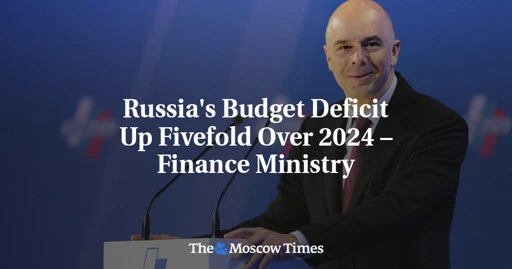Russia's Budget Deficit Up Fivefold Over 2024, According To Finance Ministry -- UPDATE: Russia Moves to Revise 2025 Budget
Russia's Budget Deficit Up Fivefold Over 2024, According To Finance Ministry -- UPDATE: Russia Moves to Revise 2025 Budget
Russia's Budget Deficit Up Fivefold Over 2024 – Finance Ministry - The Moscow Times

Update: Russia’s lower-house State Duma on Wednesday approved amendments to the 2025 budget -- [Archived]
- The budget signed by Putin last December projected revenues at 40.3 trillion rubles ($508.5 billion) and a deficit of 1.17 trillion rubles ($14.76 billion), or 0.5% of GDP. That version allocated a record 40% of total spending to defense and national security.
- Under the now revised plan, revenues are now forecast to fall by 1.79 trillion rubles to 38.51 trillion rubles ($485.9 billion). The deficit is expected to rise to 3.79 trillion rubles ($47.8 billion), or 1.7% of GDP, an increase of 2.62 trillion rubles.
- To cover the deficit, the government plans to draw 447 billion rubles ($5.8 billion) from the National Wealth Fund (NWF), which holds 2.8 trillion rubles ($36.4 billion) in liquid assets. Kremlin economists have warned that, given current trends, the fund could be depleted by 2026.
Pre-war, the NFW grew substantially due to high oil prices, particularly in 2019 and 2020, helping Russia to achieve a budget surplus.
In 2022, oil prices were again high, and additional funds would normally have been added to the NWF, but the costs of the Ukraine war forced the Kremlin to withdraw more than $16bn from the then $127.9bn liquid portion of the NWF.
In 2023, the budget deficit in December 2022 and the effect of the 2022 Russian crude oil price cap sanctions required $38.1 billion to be withdrawn, with further withdrawals expected in 2023 as a result of the continuing sanctions over crude oil.
This week, the EU announced its 18th sanctions package against Russia which includes an further drop in crude oil price cap. The NFW's liquid portion is now at around $36bn.
It is important to note that one of the NWF's main responsibilities is to support the Russian pension system. In addition, the fund is supposed to be a 'lender of last resort' for banks.
Russia's budget deficit rose by 168 billion rubles ($2.18 billion) in May, bringing the total for the first five months of 2025 to 3.4 trillion rubles ($44.2 billion), or 1.5% of GDP, according to the Finance Ministry.
That is nearly five times higher than the same period of 2024 and nearly equal to the entire deficit planned for the full year — 3.8 trillion rubles ($49.4 billion), or 1.7% of GDP.
Initially, the Finance Ministry had aimed to keep the deficit three times smaller: 1.2 trillion rubles ($15.6 billion), or 0.5% of GDP.
May’s budget results were somewhat worse than expected, economist Yegor Susin said. Revenue growth has slowed, and while spending has eased somewhat after the early-year advance payments, it hasn’t dropped as much as hoped.
Susin estimates that the current deficit trajectory is running at about 1% of GDP higher than planned, which translates to nearly 6 trillion rubles ($78 billion).
...
The main factors are low oil prices and a strong ruble. The ruble appreciated for a sixth consecutive month in May, while oil and gas revenues fell to just 513 billion rubles ($6.67 billion), their lowest point in two and a half years.
Over the first five months of 2025, these revenues totaled 4.24 trillion rubles ($55.1 billion), down 14.4% from a year earlier (after four months, the shortfall was 10.3%). The 2.6 trillion ruble ($33.8 billion) decline in oil and gas revenues is the main reason for the budget revision.
While these revenues still exceed the baseline level, the Finance Ministry warns of risks due to weakening price conditions.
...
Gaidar Institute experts predicted the budget deficit would improve after peaking in May-June. But they noted that economic slowdown, worsening trade conditions, high interest rates and geopolitical challenges are all putting pressure on the budget and worsening existing imbalances.
Still, they believe borrowing and the use of liquid assets from the National Welfare Fund could cover the shortfall.
The liquid portion of the fund had fallen to 2.8 trillion rubles ($36.4 billion) by the end of May, with 447 billion ($5.81 billion) allocated to cover the oil and gas revenue shortfall.
[As an addition, the liquid portion of Russia National Wealth Fund has almost halved since the start of Russia's war against Ukraine.]